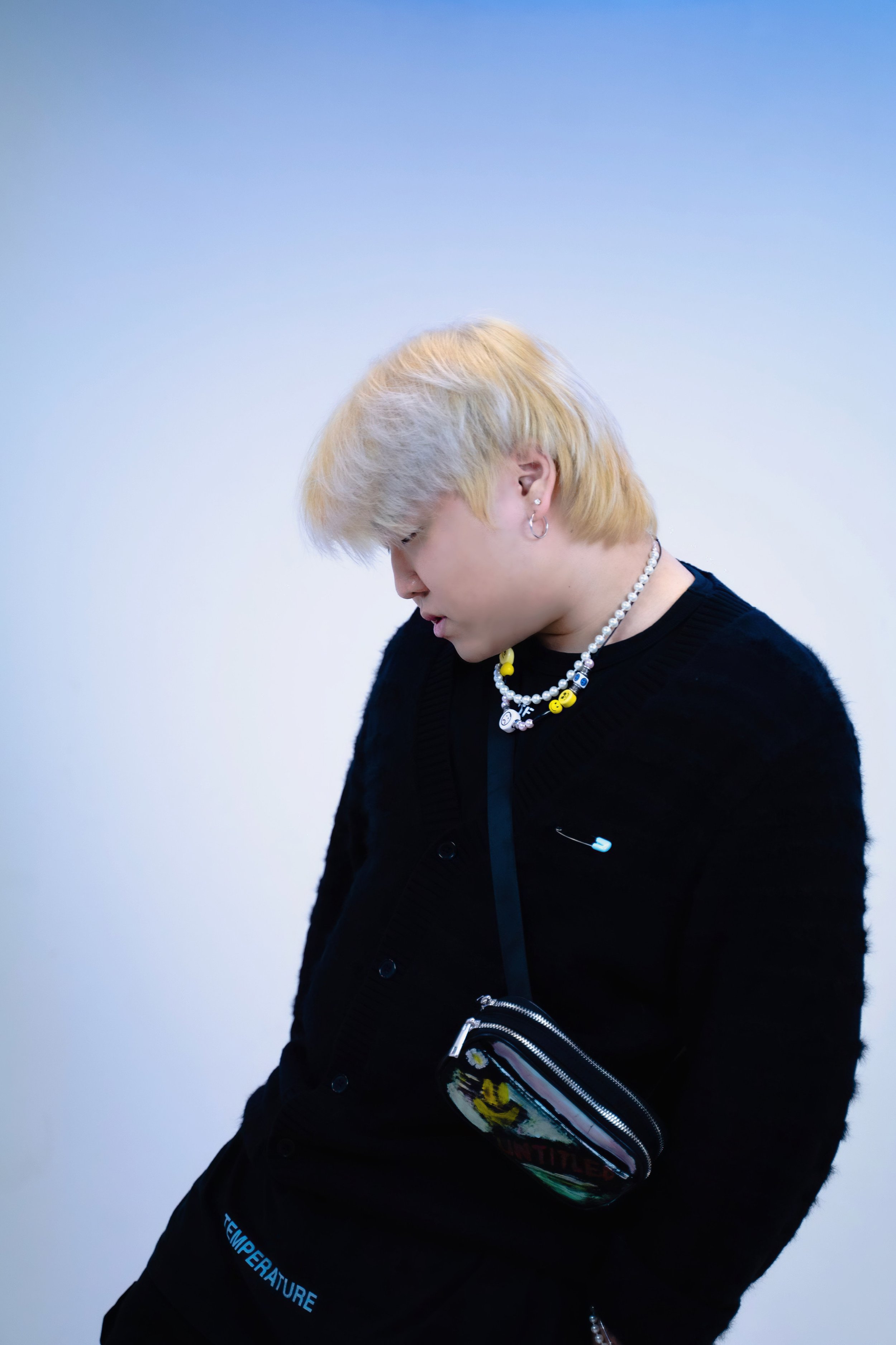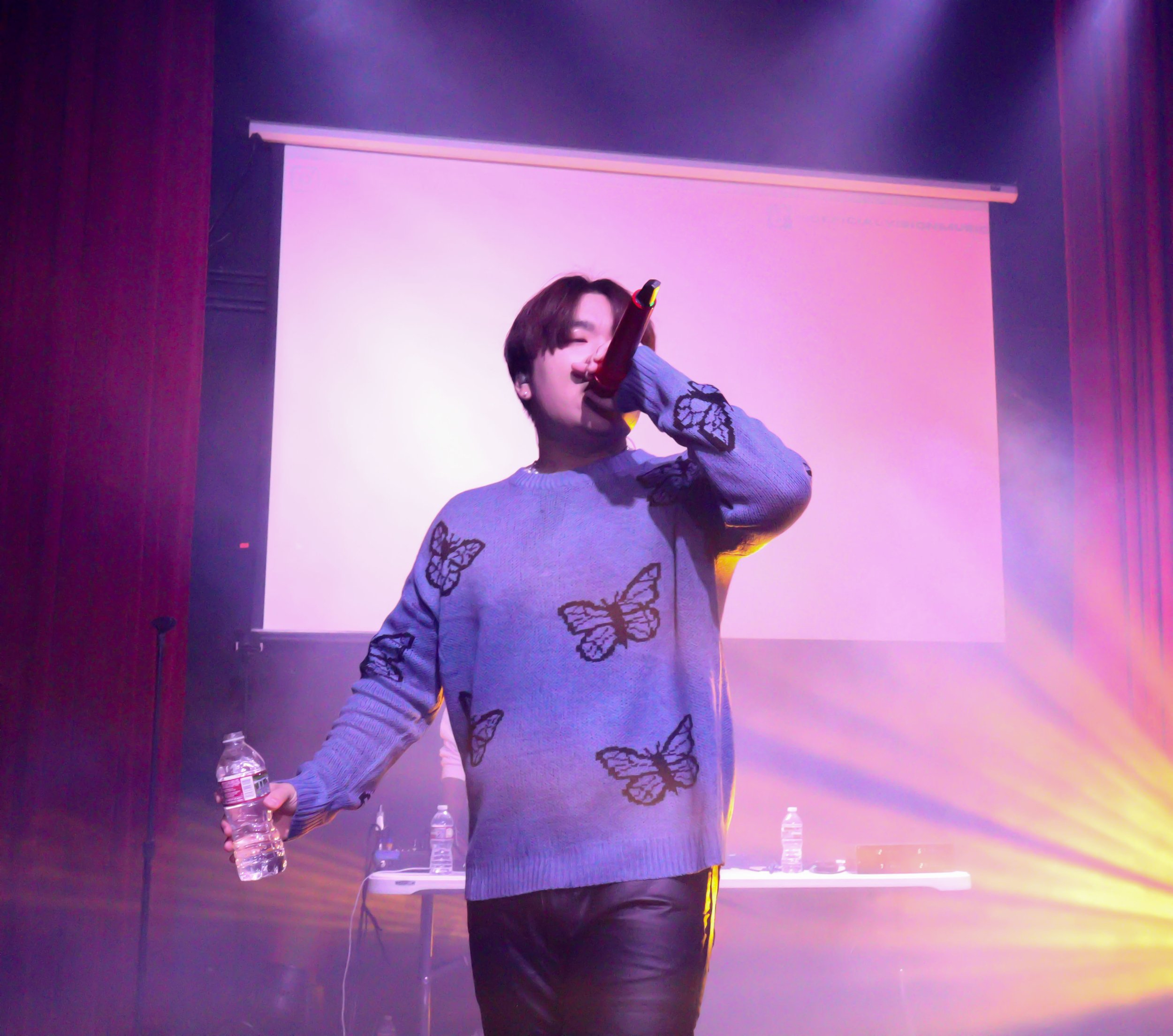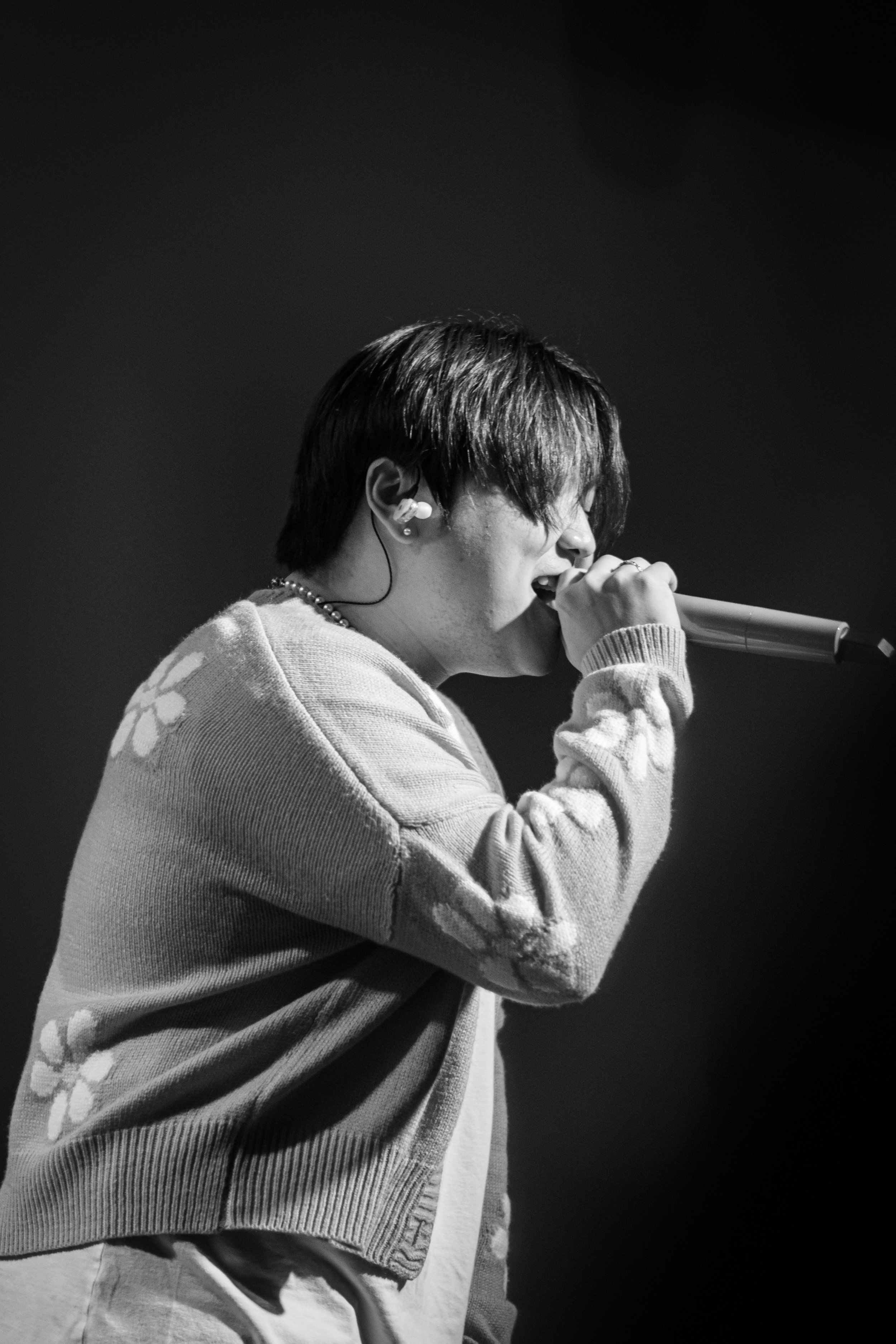B.K Studied K-Pop’s Greatest Stars. Now He’s Ready To Be One.
Two weeks ago, Korean-American singer-songwriter B.K walked into The Sunset Room in Austin, Texas for a soundcheck and noticed that the stage was smaller than he expected. It was his first time in the city and that night he was slated to open for Junny, a rising K-R&B singer.
B.K was with his friend, a rapper who goes by the stage name OSIX, and they quickly tried to reconfigure how they would hype up the crowd. Running or jumping around the stage seemed out of the question. But then something unexpected happened once showtime came. “The crowd was insane and super interactive,” he told me last Sunday on Zoom from his recording studio. He and OSIX were shocked. Onstage, Junny commented how “crazy” the crowd was.
That night, Junny gave B.K a signed copy of his album ‘blanc’. This show was his second time opening for the singer after a September show in his hometown Atlanta, where I first caught his set. “I was really humbled by Junny’s personality and character,” BK said. “For a person of his stature, he was super humble.” He was touched, too, when Junny remembered him from the first show.
B.K’s star is still ascending on the K-indie scene. He’s involved in several collectives, including Exposition, a collective of over 200 independent Asian-American and Asian-Canadian artists, XOXO Records, and Vision Music. He works with several friends, like Rave, DH and FORTY, all of whom he uses as sounding boards and collaborators for music. Many of these collaborators are friends he’s known since his childhood.
“I’m embarrassed and don’t like talking about this,” he told me, as if he was going to reveal a dark secret, before sharing that he first gained traction from his time on the hip-hop competition show “Show Me the Money 6”. But B.K’s grown as an artist since then. “I used to try to do everything,” he said. “But I decided I wasn’t doing anything great. So for two years I focused only on singing, and now that I feel like I’ve become decent at this, I’ve started to do more.”
B.K’s mother spent the majority of her life in America until she met his father, a Korean who came from a traditionally conservative household and who wanted to stay in his home country to be closer to relatives. The couple stayed in Korea in for a while, but when B.K was three months old, the young family moved to America.
B.K’s family landed in Atlanta, which had become a mecca of sorts for Korean immigrants by the early aughts. Many of these Koreans, like B.K’s family, moved to the suburbs. “Originally it started on Buford Highway, down in Doraville, but just the natural movement of the Korean community has come north,” Stone Grill owner Jason Jang told the Gwinnett Daily Post in 2014. Gwinnett County has become the largest mecca of Koreans in Georgia, with recent American Census data showing 26,600 living in Duluth, Georgia.
For the first four years of B.K’s life he only spoke Korean at home. B.K didn’t learn English until he was sent to preschool. “Growing up learning how to speak the language, growing up in different areas, and seeing not many people who look like me…” His voice trailed off. “It was a little difficult trying to find my circle.”
For many Korean-American immigrants, landing in a place like the Atlanta metro-area was crucial to finding a community. “The tipping point, I think, is when you not only have the large markets and grocery stores, but when services become available,” Sarah Park, of Explore Gwinnett international, said. “Everything from the after school services, to medical professionals, CPAs and lawyers. When my grandmother was here, she loved it because she could go to the doctor and not have to have one of us translate for her.”
“My experience is probably similar to most Korean-Americans that you’d talk to,” BK told me. For the first half of his life, B.K was surrounded by kids who didn’t look like him. “We didn’t have that much money growing up. But you know, Korean parents, they try to send you to the best schools that they can,” he said with a smile. “So I went to school in a primarily white and rich area. The one white friend who was in our group wasn’t rich, so we all felt like we couldn’t fit in. That’s why we stuck together.”
B.K was lucky, he maintains, because not one person in his life made him feel crazy for wanting to pursue a career in music. Recently, he told me, his DJ, Ron-E, reminded him that when they were kids B.K declared he wanted to be the Korean Justin Bieber. “I guess growing up in that area where people didn’t try to put you down, it made me feel like I had the right to dream,” he said. “Most of my friends dealt with parents saying no to music or thinking that music wasn’t a suitable career.”
But B.K’s parents fully supported his aspirations. “My mom told me, and she’s such a beautiful soul for this,” he remembered, “‘I’d rather leave this earth knowing that you’re going to be happy with less money doing what you’re doing, rather than you doing something you don’t want and being rich.”
His parents' support might have come from a surprising secret. Last year, B.K’s mother told him, his father admitted something shocking to her. “What he’s doing now,” B.K’s father said, “is what I wanted to do.” BK had no idea that his father was a singer.
“My mom said he has a decent voice,” he said. “But growing up in a very conservative Korea where if you were to pick up a guitar, for example, my grandfather would have shaved his head and kicked him out of the house.” B.K remembers feeling thankful that his parents encouraged him to pursue music, but also “weird”. What if, he wondered, he turned 60 with a lost dream of performing music that had attached itself to him and wouldn’t let go?
“My mom was an art teacher and my dad is in construction,” he said. Still, his father found a way to be creative, even in a job as restrictive as construction. “He likes building stuff with his hands,” B.K added. Last year, B.K’s father used his hands to build a recording studio for his son. It felt like a gift from a father who never was able to pursue the dreams of his own life.
“My father would always say, ‘Go after music,’” B.K said. The recording studio ensures his son can.
B.K still remembers the first time he felt the visceral impact of music. “A few years ago, I went through a pretty shitty time and what gave me the most comfort for this was music. But then there wasn’t anybody making songs about how I felt and that made me feel really lonely,” he said, “I’d think, ‘Am I the only person who made this way?’ But BTS’ earlier albums, when they were talking about some real shit, really resonated with me.”
BTS, he said, made him feel understood, as if he wasn’t the only one who felt crazy or depressed. Those earlier albums, like Wings or Love Yourself, spoke to the singer. “I wish I could love myself,” Namjoon raps on “Reflections”. B.K did too. And then something interesting happened: “As they matured musically and their storylines came to a close, my depression came to a close, too,” B.K said. “I realized music has this power and if I can be that for at least one person in this world, then maybe my life is purposeful.”
He began perfecting his voice; learning how to breathe properly and how to open his throat to sing more clearly. When I asked if his falsetto came naturally to him, he laughed and replied emphatically, “Hell no. I have a higher tone so it is easier for me to imitate female singers,” he explained. “You learn by copying, and luckily, I have a decent, distinctive tone but I don’t believe that I was born with it. I feel like if I were to say I was born with it, it would be arrogant as hell because I’ve put so much time into developing this.”
He studied the greats in K-Pop to capture his sound: Jimin and Jungkook from BTS, Jay Park, BigBang’s Taeyang, as well as several women, like Kehlani. Today, B.K’s distinctive high-pitched voice could easily fly over a hyperpop track. B.K credits this growth to his team, and the friends in the industry who surround him. His friends are talented songwriters, he acknowledges, who can help him craft a pop song or give him feedback on a beat. “I have a good team around me. They’re honest. I don’t like to have things sugarcoated for me. I need honest feedback because I want to grow,” he said. “If I want to perform with someone like Jay Park or Jungkook one day, I have to be on their level.”
B.K’s stage persona can feel effortless, but this comes from hard work. “Even on the days that I feel self-doubt, I try my absolute best to think about it as everybody goes through this thing. But I’ve worked way too hard to give up – and if you never quit, you never fail, right?” he said with a smile.”
This industry can be challenging. There are so many like B.K who are pushing to be heard, but he works to not let the noise get to him. He’s planning a tour this summer, and on April 21st, he’ll open for another rising K-R&B singer named GEMINI in Atlanta.
“I try my best to treat this job like something I have to do no matter what and that I don’t have a choice. And it makes me really happy,” he said reflectively. “When I think about it, who really gets to do this every day at the amount of hours I do and doesn’t have to worry about real life stuff as much?”







